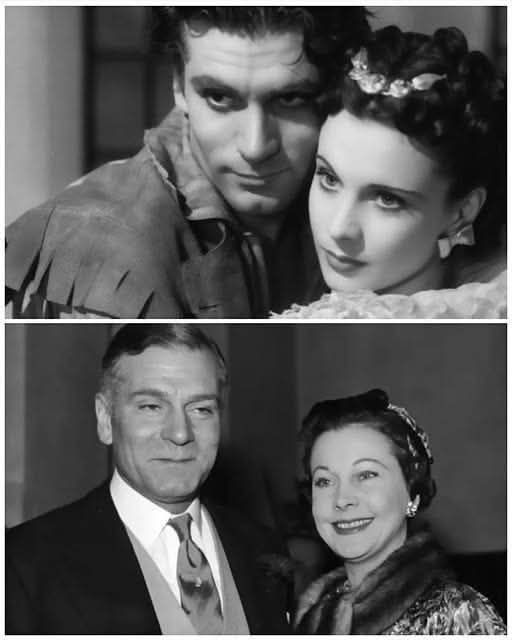n 1935, Vivien Leigh, a young actress married to barrister Herbert Leigh Holman, led a life that, despite its stability, lacked passion. That year, she saw Laurence Olivier perform on stage at The Theatre Royal, and she turned to a friend, whispering, “That’s the man I am going to marry.” At the time, Olivier was married to actress Jill Esmond and was establishing a successful career in the British theater scene. Yet, his personal life felt incomplete, lacking the intense connection he longed for. Fate, however, had already set the stage for their inevitable union.
The two first connected in 1936 when they starred together in Fire Over England. Their chemistry was undeniable, felt in every glance, every touch. Both were still bound by their marriages, but the attraction between them was too powerful to resist. They tried to suppress their feelings, knowing the scandal it could cause, but soon their desire overcame their hesitation. They began an affair, exchanging letters filled with passion and longing. Leigh wrote of her overwhelming love for Olivier, confessing she could not breathe without him. Olivier, in turn, described her as both his greatest joy and his deepest torment.
By 1937, they could no longer hide their feelings. The affair began to captivate London’s theater circles, and despite the judgment of society, they devoted themselves to one another. Olivier encouraged Leigh to pursue her ambition of landing the role of Scarlett O’Hara in Gone with the Wind, while she supported him through his pursuit of the iconic role of Hamlet on stage. When Leigh won the part in 1939, she became an instant Hollywood sensation, but it was Olivier’s unwavering belief in her that gave her the confidence to succeed.
As 1939 unfolded, their love became impossible to conceal. Olivier left his wife, Jill Esmond, and Leigh divorced her husband, Herbert Holman, both sacrificing everything for their relationship. In 1940, they married in a small ceremony in Santa Barbara, California, and the world saw them as the epitome of a perfect love story. Beautiful, talented, and adored, they seemed invincible. They traveled the world, dominating both Hollywood and the British stage, and publicly, they were the golden couple. Yet, behind the glamorous façade, cracks began to appear.
Leigh, struggling with severe bipolar disorder—a condition poorly understood at the time—became more unpredictable. At first, Olivier tried to shield her, standing by her through her manic episodes and depressive moods. One moment, she was radiant and brilliant; the next, she would spiral into fits of rage or despair, only to collapse in his arms, sobbing, seeking forgiveness. Olivier loved her desperately, but he was helpless in the face of her illness.
In 1951, while performing in A Streetcar Named Desire, Leigh’s mental health deteriorated further. Olivier, exhausted from trying to hold their world together, became distant. On the set of Elephant Walk in 1953, she suffered a severe breakdown and was replaced in the film. By then, Olivier had fallen in love with actress Joan Plowright, and though Leigh never spoke of it, she knew. Their marriage, once filled with passion, had turned into a battlefield of pain and loss.
By 1960, the inevitable happened: they divorced. There were no dramatic accusations, no outpouring of hatred, just the quiet devastation of two people who had once been everything to each other but could no longer bear the weight of their love. Despite the separation, Leigh never truly let go. She kept a photograph of Olivier by her bed and often spoke of him fondly.
In 1967, at the age of 53, Leigh passed away from tuberculosis in her London home. Olivier, who was then battling cancer, was heartbroken. Though he could not attend her funeral, he sent a private message to be shared with close friends, revealing that he had never stopped loving her. He lived until 1989, passing away at the age of 82. When asked about Leigh in his final years, Olivier simply said, “She was my heart, and when we lost each other, we lost ourselves.”
